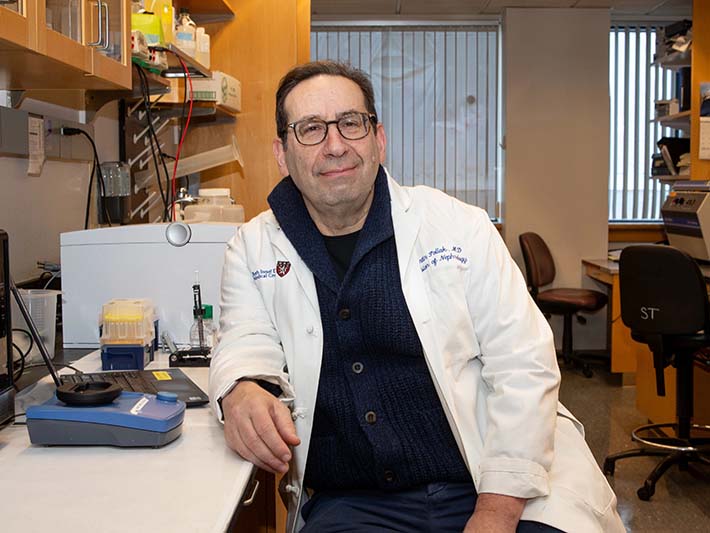
Martin Pollak, MD
Genetic Discovery Propels Progress
Q&A with Martin Pollak, MD, Chief of Nephrology
More than 500,000 Americans suffer from end-stage kidney disease. This debilitating condition, which necessitates dialysis or kidney transplant to maintain life—affects African Americans at significantly higher rates than European Americans. Philanthropy has been crucial to accelerating research on the underlying causes of kidney disease and the reasons behind this disparity.
In 2010, Chief of Nephrology Martin Pollak, MD, along with David Friedman, MD, and their teams demonstrated that genetics play a key role in the disproportionate rate of kidney failure among African Americans. Specifically, they showed that specific variants in the Apolipoprotein-L1 (APOL1) gene—which are common in people of recent African ancestry but essentially absent in other groups—were linked to kidney disease.
While it takes significant time and effort to translate scientific findings into effective interventions, donor support has been a powerful catalyst for Pollak and his team, allowing them to pursue innovative lines of investigation and more quickly bring new potential treatments to patients. Philanthropic contributions were critical in enabling them to build on their initial breakthrough and ultimately forge a collaboration with Vertex Pharmaceuticals. Since then, Pollak and colleagues have been working closely with Vertex to develop a therapy for the treatment of APOL1-mediated kidney disease and have recently begun work on community-based studies using this genetic information to help diagnose kidney disease at an early, treatable stage.
Pollak recently received the David M. Hume Memorial Award from The National Kidney Foundation in recognition of his exemplary efforts in the field of kidney disease. We spoke with him about the implications his work has for managing the disease, particularly among the African American community.
Can you describe your original investigations?
Kidney failure is strikingly more common in people of recent African ancestry. A lot of work had suggested that both genetic and nongenetic factors were contributing to this racial disparity, so my colleague Dr. David Friedman and I decided to focus our work on the genetic aspects of the disease. This led us to the APOL1 gene variants, which originally evolved to protect people of Western African descent from a parasitic disease but appear to have also led to an increased risk of APOL1-mediated kidney disease.
Last year, Vertex Pharmaceuticals published the first clinical evidence that a personalized therapeutic called Inaxaplin demonstrated success in treating patients with APOL1-mediated kidney disease. You and Dr. Friedman were deeply involved in this study. Can you speak more to this?
As we began to develop our ideas, it became clear that we needed to expand our efforts beyond our lab. We formed a small company, which then led to our collaboration with Vertex Pharmaceuticals, which provided us with the additional expertise and resources necessary to move things forward. This collaboration enabled the development of small molecules to correct the way APOL1 was altering certain biological properties, and these personalized therapeutics have now shown promise in reducing early signs of kidney disease progression in a small clinical trial. We’re hopeful that this will lead to larger clinical trials to confirm this treatment is effective.
This genetic information is also helping you and your team explore ways to try and prevent early kidney disease from developing into a dangerous, life-threatening condition, particularly in the African American community. Can you tell us more about that?
I’m of the opinion that in many cases, kidney disease is being diagnosed much too late. Kidney disease is typically asymptomatic until it reaches advanced stages, and once the kidneys have failed, patients require dialysis or a kidney transplant in order to stay alive. By identifying APOL1 through genotyping and measurements of protein in the urine, we can single out individuals who may be at particularly high risk for disease. We can then intervene with therapies that can slow disease progression and can also educate patients regarding diet modifications and blood pressure medications to help them better manage their conditions. These are simple measures that could make a significant dent in slowing the progression of kidney disease, and I’d love to see them widely implemented.
Can you describe the role that philanthropy plays in your work?
Philanthropic support has allowed us to pursue some non-traditional research avenues that might not have been possible through traditional funding mechanisms. Not having to worry about our next round of funding has helped us to be less risk-averse in our work and enabled us to move forward with the pursuit of a therapeutic. Importantly, philanthropic support is also helping us to extend our work from the lab into the community.
What do you see as the broader implications of this work, and why is it so important?
I’m not a public health specialist or epidemiologist or primary care physician by training, but I feel like this direction is necessary if we’re ever going to make an impact. Among the more than 500,000 individuals with kidney failure who are on dialysis, an astonishing 40 percent are identified as Black or African American. We think that APOL1 may be contributing to kidney failure in at least half of this 40 percent. It’s a really astonishing disparity, but I’m pretty optimistic that if we can identify people who are at particularly high risk of developing this type of kidney disease, we can intervene early to slow progression. I think that’s where we can be especially impactful.
